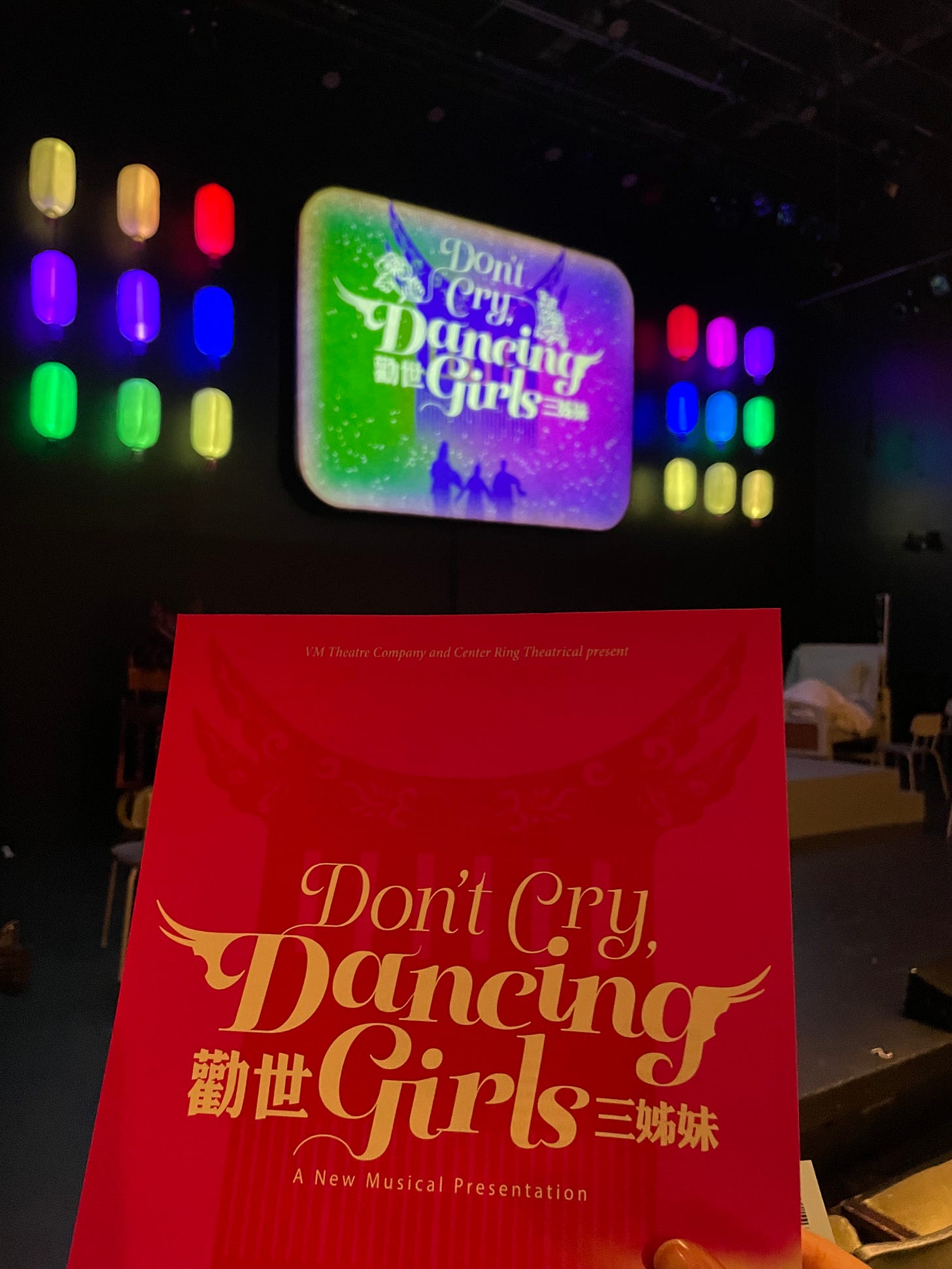Don't Cry, Dancing Girls: A Taiwanese Musical in New York
Also, how much should you have to explain yourself when telling a story across cultures?
This week, I had the privilege of previewing a Taiwanese musical at Theater Row, slightly off Broadway. The story of Don’t Cry, Dancing Girls follows 3 city-dwelling siblings as they return to their rural ancestral home, confronting religious traditions, social expectations, and financial distress.
Co-produced by VM Theatre Company from Taiwan and Center Ring Theatrical, the 4-show workshop presentation was invitation-only, and the Taiwanese diaspora and industry folk in New York packed out all 4 performances. The production is in Taiwanese, with some Mandarin sprinkled in. English and Traditional Chinese subtitles were projected onstage.
I laughed, I cried, and then I cried some more. For the record, my Taiwanese Hokkien is conversational at best, so I had to rely on the subtitles. It’s not an easy thing, putting on a musical in a foreign language. A musical already has a lot going on onstage. Subtitles become one more thing dividing the audience’s attention, though I have to say, the translation was superb.
This production is in-your-face, unapologetically Taiwanese. There are a lot of cultural elements within the story that can easily confuse non-Taiwanese audiences. The location names (the story is set in Yunlin, but would an American know that it’s in rural Taiwan?), the funeral rites (what is “singing the dead”? should we pause the show to explain it?), the character names (Chinese names lose much of their uniqueness when rendered in the English alphabet). In what I assume is a special feature for the New York production, a narrator comes onstage between scenes and explain some of the plot and characters in English, which was jarring, but helpful.
Throughout the show, I worried how much the story connected with the non-Taiwanese audience. It’s an occupational hazard for an interpreter; I’m hyper-aware of linguistic and cultural gaps. But then I thought: Do people around the world enjoy Hamilton less when they don’t know American history?
This musical has been wildly popular in Taiwan and performed sold out shows all over the country. Clearly, the story resonates. Are humans that different? Who wouldn’t connect with a story about an eldest daughter carrying the weight of the family? Who wouldn’t laugh over siblings bickering? Even if they don’t understand the Taiwanese curse words, the tone of voice would still register loud and clear.
To explain yourself is a choice. It reminds me of a discussion we had in a translation class in grad school: Why is it that, in the West, Chinese dishes are often translated (fried rice, beef noodles, braised pork rice, hot and sour soup…), but Japanese and Korean foods appear as they are (ramen, sushi, kimchi, bibimbap, bulgogi…). It’s a matter of cultural confidence.
When you hail from a 25-million-strong island that’s been bullied and excluded from the world stage, the instinct is to over-explain.
But what if we don’t? What if we trust the audience to connect with us because we’re all just people? Especially in a medium that’s as rich and robust as a musical, where the acting, set design, lighting, choreography, and music all come together to tell a story for all of your senses, why wouldn’t the audience shed tears for someone’s struggles? Does it matter if it’s in a different language? My poor Taiwanese certainly didn’t stop me from bawling my eyes out.
In an Instagram post from the Taiwanese theatre company, they shared that their American counterpart had initially asked to make the funeral finale “less ritualistic” to cater to a mainstream audience. But once they saw the full production, they insisted that the finale should be presented entirely in its original form.
I sincerely hope Don’t Cry, Dancing Girl will get its run on Broadway. It’s a deeply moving, deeply human story vibrantly presented in all of its Taiwanese-ness. May it remain loudly and proudly Taiwanese as it steps onto the world stage.






